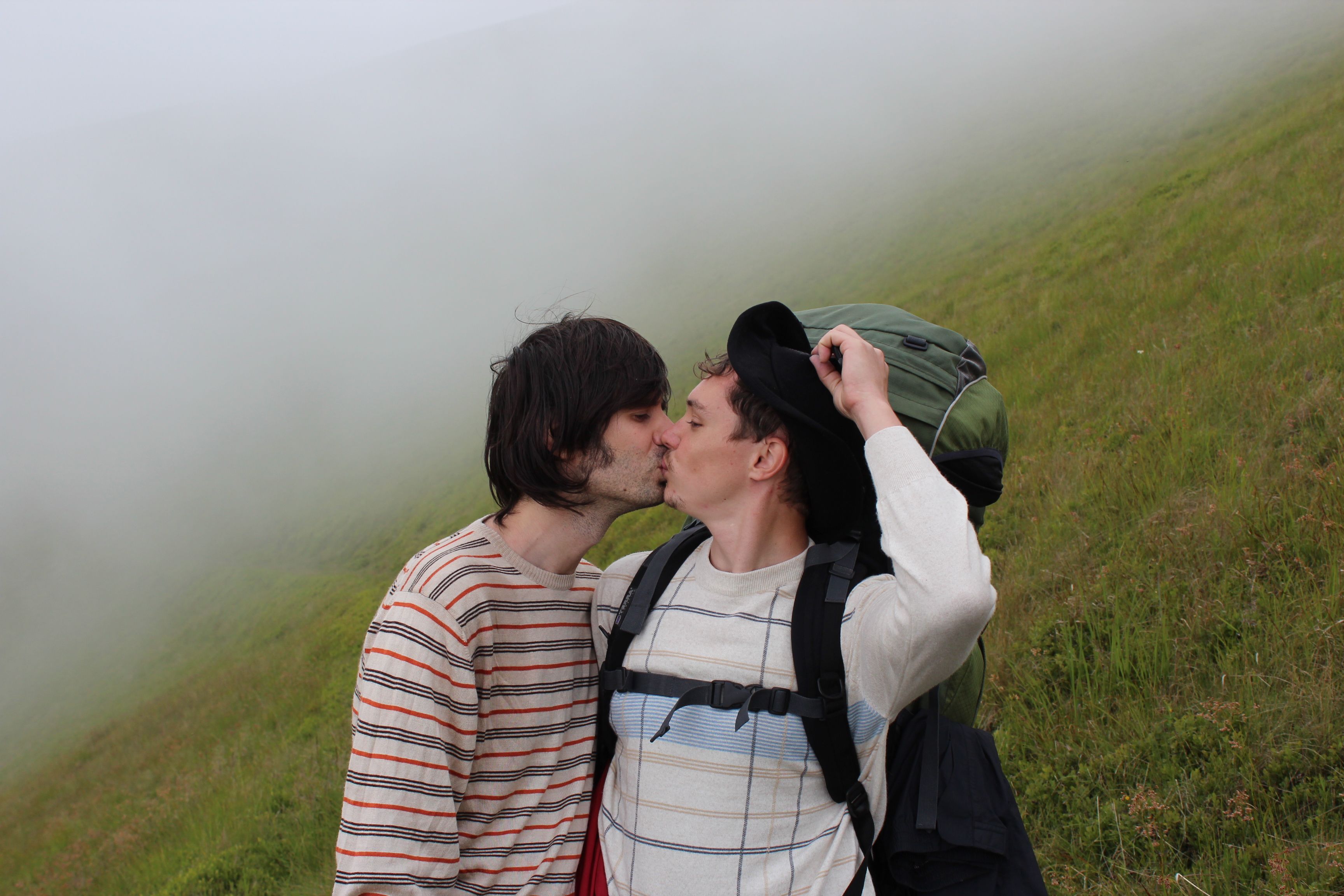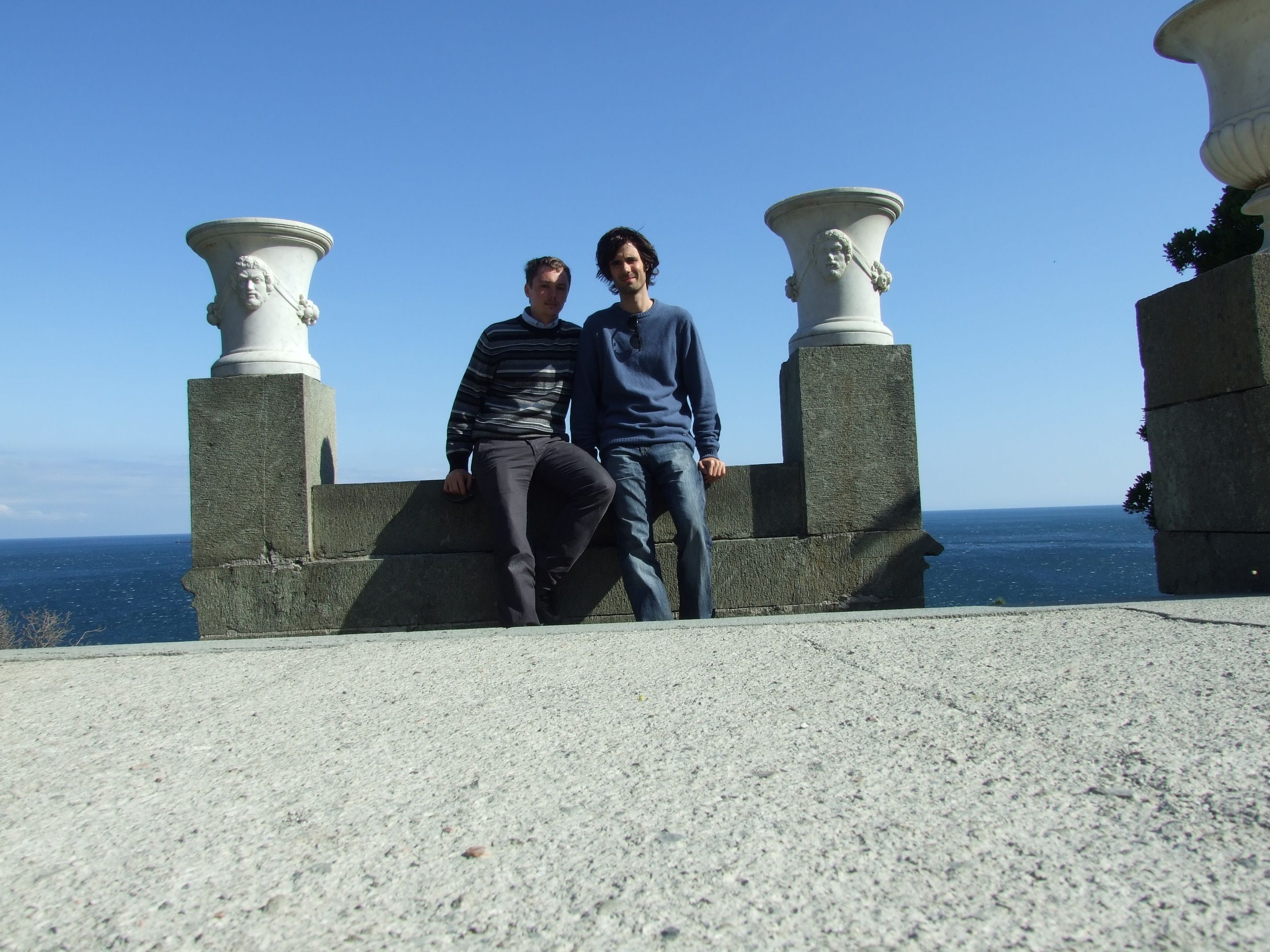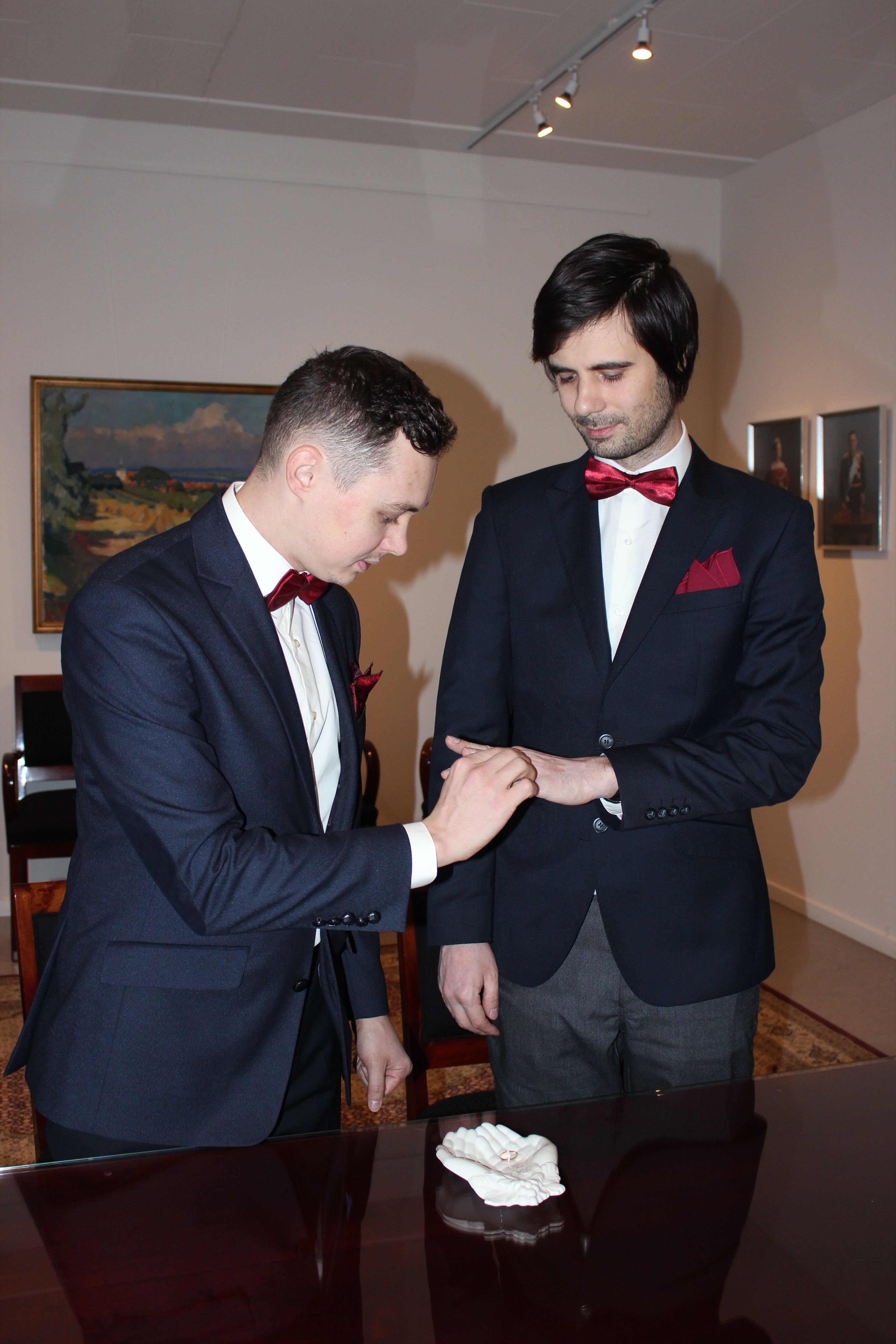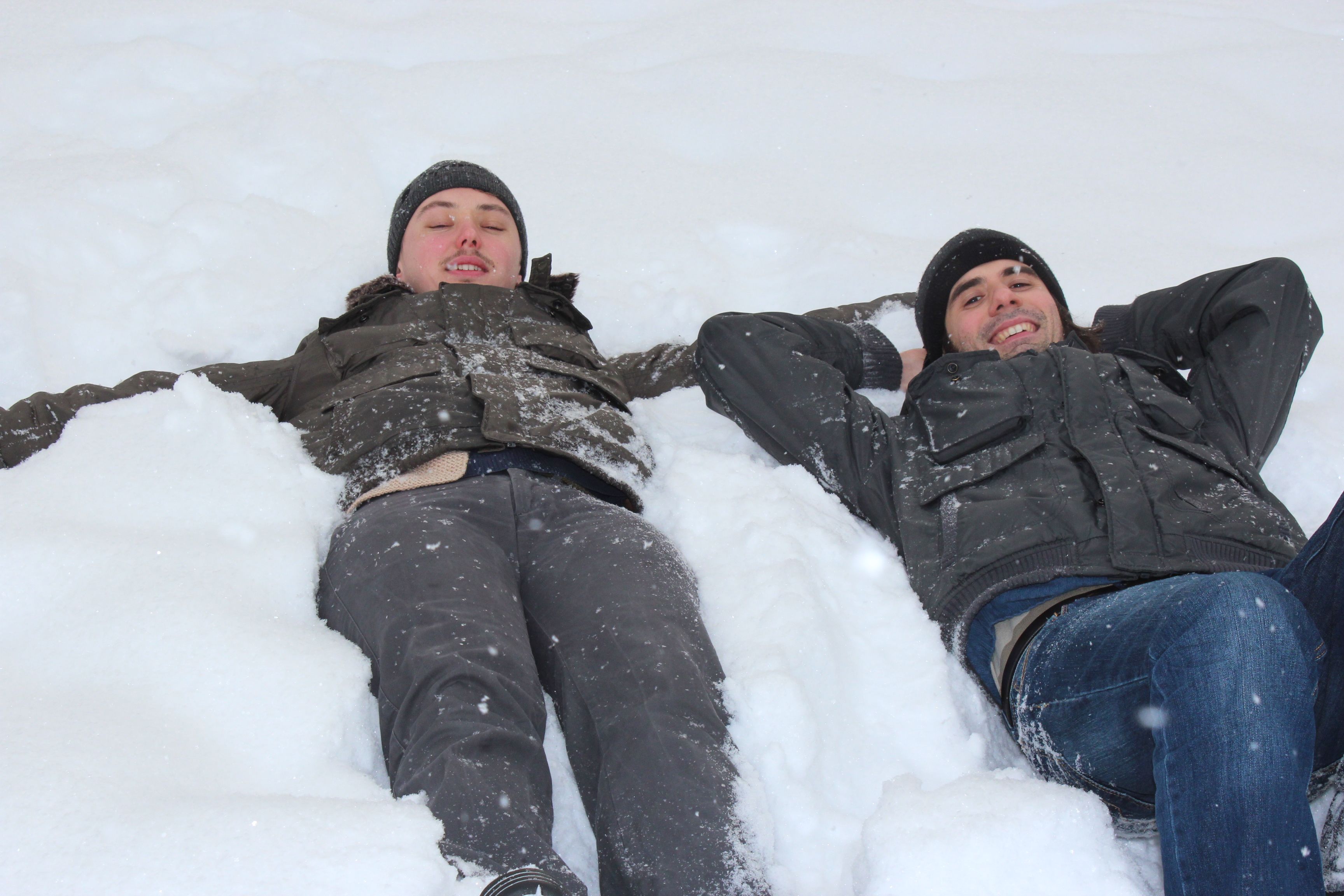Damien and Dmytro
Damien was born in a small town in the Kherson region of Ukraine and graduated with a degree in Computer Systems and Network Engineering from the Kherson National Technical University. He always knew that he was into guys for as long as he could remember, but very quickly realized that he should hide it. Damien first moved from his parents’ home to Kharkiv, where he met his future husband, and ten years later they were married in Denmark. From Kharkiv, the couple moved first to Kyiv, and from there to the United States.

My Coming Out Story.
It was 2014, and the Euromaidan protest movement was underway. My husband and I supported the movement and donated $1,000 to it because we believed that Ukraine should join Europe in a bid for economic and political stability. When people are poor and hungry, they are angry, and they cannot be bothered to care for gay pride and LGBT rights, but on the contrary, they can only get annoyed with those causes. At the same time, our anniversary was approaching (we mark two of them: when we first met and when we started living together), and we decided that we wanted to get married in Denmark. We bought an apartment in Kyiv and completed a renovation. A few weeks later, Dima's parents arrived, but they did not know what was in store for them - that we had decided to come out. Fortunately, the process went quickly, and Dima's mother told him to call me - and that is how she and I were first introduced.
Hopes and Reality.
I was very inspired by Dima’s experience and hoped that my coming-out with my parents would go smoothly as well. I knew there was no guarantee, but I was determined to go through with it. I was concerned about my mother's health, so I surreptitiously gave my parents a calming herbal tea, and drank some myself. Sadly, things did not go the way I wanted and hoped them to at all. Despite being a gay man myself, I still had preconceived notions and thought that my mother would accept me easier than my father, and in any case thought that I would survive unscathed if my parents did not accept me. However, everything turned out completely wrong. My mother said a lot of unpleasant things, and when I told her that several of my friends from my home town knew about me and that both my partner and I want to have children, that did not help at all. It all boiled down to "What will people say?!" This phrase gnawed at me from the inside for many years. My parents then said they wanted to leave and go home, so they did so immediately. I did not go to my parents’ for New Year's Eve that year because my father said that it would be easier on my mother if I did not visit for a while.
I had a healthy relationship with my sister, who is ten years younger, and I told her long before I told my parents. However, when they returned back home, they managed to turn her against me and we stopped talking for a while. I suppose she was still a teenager and that it was easy to manipulate her since she was living under our parents’ roof. After this debacle, I rarely spoke to my father by phone and did not speak to my mother at all.

"Sasha from Canada".
In January 2015, my good friend Sasha, who lived in Kyiv, was killed in his apartment. I liked Sasha because he was incredibly open, and at the same time so confident, a feature that I lacked so much. One could immediately identify him as a gay man, as it was hard not to notice. For me, he was like a breath of fresh air; he was a little provocative, always cheerful and very smart. My partner Dima and I told him about our plans to get married, and Sasha was profoundly serious about becoming our witness. He returned to Kyiv from Canada, where he was a citizen, to take care of his mother, to whom he had come out a long time before. Sasha was killed in his apartment by three man, who first taunted him and finally strangled him. He was 44 years old, around 5'1", about 130 lb. He had just landed an excellent and respectable job and bought himself a new phone and a watch. He had started dating a guy, but I never met him since Sasha said that the guy was shy and discreet. After several dates, Sasha invited the guy to his apartment when Sasha’s mother was not at home. Unfortunately, the truth was that the guy in question was not gay at all - he was an actor who played a sinister role. When Sasha invited him home, he let two more men into the apartment, who robbed and then killed him.The perpetrators were caught and Sasha's older brother sat as a member of the court; the criminals offered him a bribe to dismiss the case and showed absolutely no regret over what they did.
The idea of Dima and I getting married on the 10th anniversary of the day we met fell apart. I learned about the tragic event from common friends the same day that it happened. The next day I took a day off and went to Sasha's house to verify this unbelievable tragedy for myself. I took photos of the documents left by the investigators and posted them on social media - because no no one who knew him could believe that he was gone. The call before the flight
At that time, Dima and I were already planning a vacation and had tickets to Istanbul, Turkey at the end of February 2015. We had planned this trip long in advance, when Sasha was still alive and well. In the evening on the day before the scheduled departure, my mother suddenly called me. I could not understand what was happening, because up until then I had always only talked to my father. My mother told me to "get back home by tomorrow." I told her I could not because I had plane tickets to Istanbul for the next day, and “back home” was 350 miles away . I asked her what had happened, but she would not answer. I thought something had happened to my father and asked to speak to him, but it turned out that he was fine. On the phone, he said "listen to your mother" and would not tell me what if anything had happened. Given that both were obviously alive and well, and spooked by the tone of my mother’s voice, I decided to go ahead with the Istanbul trip as planned. To say that the vacation was a failure would be an understatement, because all during the trip all I could think was about Sasha and my mother.
Eventually, my mother succeeded in turning my father against me entirely. After that, my father only called me once, when he was drunk - and naturally, that was an unpleasant call. Among other things, he said to me that "We are ashamed to go about our town and look people in the eye." From that moment, I stopped talking to my father as well, with the exception of September 2015, when he was diagnosed with lung cancer and called to ask me for money - which I gave to him out of money he and my mother had given me a few years before.
Marriage in Denmark
2016 saw the ten year anniversary of Dima and I moving in together - the ten year anniversary of our first date had gone and went during the tragedy with Sasha’s murder. We decided that we did not want to postpone our wedding any longer. Sasha should have been our witness, but life is unpredictable and disasters happen every day, and no one knows what will happen tomorrow. We felt that we had to live in the moment and to do what is important here and now. We made preparations and, in January 2016, we took a week’s vacation and got married in Denmark on Aero island. It was a very happy and exciting event. We had lived together for ten years and nothing had changed, with the exception of a piece of the paper certifying that we were married, but we were incredibly happy and filled with emotions - the light at the end of a long and dark tunnel, a breath of fresh air. There was only the two of us at our ceremony.

Father
In the summer of 2016, I had a nervous breakdown while watching The Big Short, a 2015 movie about the 2008 financial crisis. I started to shake and could not calm down, as if I got cold chills and could not warm up. At work, I became extremely nervous, irritable, and emotional - something I regret now.
My father came to Kyiv for his lung cancer treatment and we met for the first time in years. I took him along Khreshchatyk (a famous street in downtown Kyiv) then through the streets of the city downtown, and finally to the Potbelly House restaurant (the original Puzata Hata), where I gave him more money for the treatment. He was very excited and constantly recalled distant relatives and ancestors, probably because I was making a family tree; I wrote down all he said on my smartphone. We spent almost 6 hours together, and when I brought him to the train station, we hugged and said goodbye. That was the last time I saw him as he was already in Stage III of his cancer.
When my father returned home, he got worse, and a few days later while at home he lost his mind. He spoke nonsense, and sometimes was disoriented or became aggressive. The doctors said that the cancer had metastasized into the blood system and that death was imminent. I started having panic attacks, convulsions, muscle twitches, and irregular heartbeat. Dima and his parents, my older cousin (who lived in Odessa at the time) and a few friends to whom I am very grateful were my source of moral support.
My mother called me for the first time in years and told me what my younger sister already had about his condition, and said that I should go see him before he died. I however could not - I was so tense and anxious that I did not know what to expect from myself. I was afraid of what he - not realizing and not understanding himself - could tell me before his death. He could have told me something that would stay with me and cripple me forever. My mother called again once or twice, but I did not go to see my father before his death in early September 2016. I went to the funeral and since then my mother and I began to communicate again - at which time I told her that I got married to Dima.
Thanks to my profession, my husband and I were able to move to the United States. Below is a link to a short interview about my story and how we live here. This video is part of the BROTHER project - a film which collects multiple real stories like mine into one about the choice between love and family, why people from post-Soviet countries have to make this choice more often than others, why they emigrate to other countries, and how they feel there. Subscribe and follow the news on Facebook, Instagram, and Web page of the project.
In Kyiv I was a big fish in a small pond, here I am a small fish in a big one.
I made extremely good money back in Kyiv, comparable to a US salary, because I was one of only a few specialists in Ukraine at the time with experience in costly equipment for Data Centers. I was both a pre-sale and a post-sale engineer who set up that equipment, provided support, gave presentations at various IT conferences, and conducted training for our partners. But, as they say, money does not equal happiness. I wanted a change and I wanted to live in a society where I should not have to hide that I am married to a man.
Emigrating to another country is an exceedingly difficult task. Also, unfortunately only few people can take root and settle in their new home country. When you have already gained some recognition back in your native country, and you emigrate, in your new home you have to prove yourself, you do not know anyone, you do not have a Western education, and you have an accent. All that makes the transplantation very difficult, and this little paragraph could not possibly describe every problem faced by the immigrant - but everything is possible if you try hard!
Here people do not draw a line between same-sex and heterosexual couples. And you know what? The percentage of straight people as part of the population has not decreased - it is just that everyone lives together happily. And that is great!

How would it be in Ukraine?
Dima and I bought an inflatable air-couch and walked to Lincoln Park to lay down under a tree. Dima sat down to read his book on one side of the couch, and I lay down on the other to put my legs on top of his, pulled my cap over my face and snuggled. After 10 minutes, a little girl of about 5 came up to us, and I heard her parents say “Do not disturb them, you see these guys are resting!” “I also want to sit on that thing!” said the little girl.
I was half asleep with my cap over my face and I was dearly hoping that this conversation was not about us. Dima noticed the girl and shook me awake, at which the girl's parents apologized: “She really wants to sit on your inflatable couch,” they said. I got up and told the little girl to take my place on the couch. The girl smiled and happily jumped on the couch, only to jump off it half a minute later and run towards something else that caught her attention. Her mother yelled after her: “What should you say?” “Thanks!” shouted the little girl mid-run.
The girl's parents apologized for the inconvenience once again. The girl disappeared from our sights with joyful cries towards her new adventure, and I lay down again, put my legs on Dima's, and pulled my cap over my face. Before falling back asleep, for a moment I thought what if at the age of 5 I had seen that that two men could be together and that that was OK, I would have known that my parents would love me the way I was no matter what.
We seek to assist Ukrainian LGBTQ + individuals living in the US and Canada to integrate, adapt, and productively contribute to American society.
Anna Konde
Балтімор, США
Pavlo and Brian
Los Angeles, CA
Aleksandr Smirnov
New York
Tanya Mazur
Washington, D.C.
Svitlana Zemlyana
Novi Sanzhary, Ukraine
Dmytro and Ronaldo
New York, USA
Dmytro and Phillip
New York, USA
Viktor “Frenchman” Pylypenko
Kyev, Ukraine
Dmytro and Rob
New York, USA
Lyosha Gorshkov
Pittsburgh, USA
Roman and Anton
Атланта, США
Bogdan Globa
Washington, D.C.
Viachaslau and Shawn
Washington, D.C.